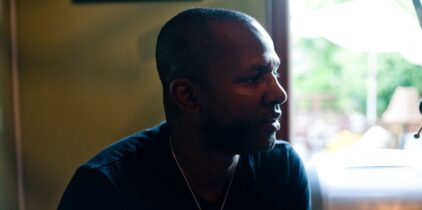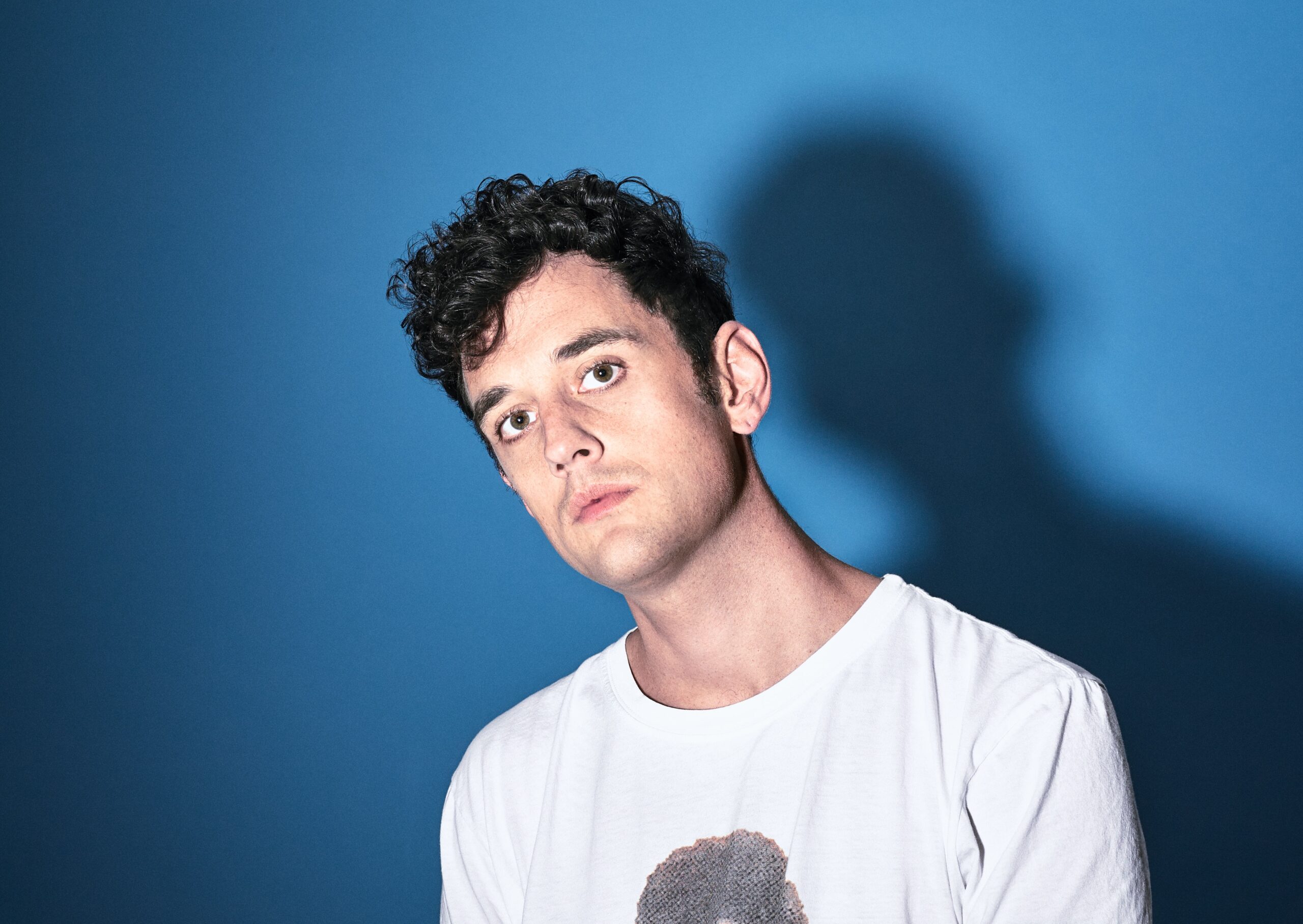Diversifying Your Musical Skillset
This interview was originally published in December 2014.
David Ryan Harris is a Los Angeles-based guitarist, singer and songwriter. Raised in Atlanta, he got his official start in the music business as the lead singer of the hard rock group Follow For Now, which was signed to Chrysalis Records and released a self-titled album in 1991 before disbanding. In the late 1990s, he put out his debut solo album on Columbia Records, then went on to form Brand New Immortals with Johnny Colt of The Black Crowes in the early 2000s. Since then, David has performed and recorded with, written for or produced many successful artists including Dave Matthews Band, John Mayer, Santana, Marc Broussard and India.Arie all while continuing to play his own music.

David talked about how he has successfully diversified his work in order to thrive in the ever-changing music industry. He also shared some advice for other artists who want to make a long-term career out of music.
MC:
Thanks so much for taking the time to speak, David. The first time I heard about you was back in 1991 when I went out and bought Follow For Now’s self-titled album, which ended up being the one and only album you put out with that group. How did you get into music?
DRH:
I definitely got into the music business with that band, and it was without any real game plan. We were just a bunch of people who really loved playing music, and music that wasn’t typically black music. At the time, I think we believed we were going to be discovered somewhere by some big, rich record executive, singing in the grocery store or something, and that we would become famous. We were kind of ignorant of the business side of the industry. We were just playing music because we loved it, and people caught on.
I’ve been a singer since I could talk, according to my mom. The business part came along with playing the music that I love.
MC:
Obviously, you had a product to share and you had talent. I don’t tend to talk about the talent side, because it’s just not something you can teach. If I could teach someone how to write songs like The Beatles, the first person I would teach is me, and I would be in a very different line of work. When you got Follow For No together, it was the late ‘80s, early ‘90s. What do you think you did correctly when it came to promoting the band?
DRH:
Back then, around Atlanta proper, advertising involved printing bills and putting them on telephone poles and at clubs. For us, fortunately, a lot of our promotion was done successfully through word of mouth, because much of our audience was made up of college kids. And with college kids and college radio, even today, word of mouth works really well. College kids are just really excited to find new music and tell their friends about it.
It was really such a different world for us then though. When you asked me this question, I honestly had a hard time remembering exactly what we did. I suppose we really just played anywhere and everywhere we could, posted hand bills and posters everywhere and then got other people talking about us. Luckily all those things we did worked well for us.
MC:
I run into a lot of aspiring artists who get really down about the fact that word of mouth doesn’t necessarily happen instantaneously. Do you remember a moment during the days of Follow For Now where music turned from a hobby to a serious professional pursuit?
DRH:
There was a club in Atlanta called The Cotton Club, which held 700 people or so. The first time we sold the club out, we were really surprised because it felt like it came out of nowhere. It doesn’t necessarily seem like a big number now, but at the time, we were genuinely happy to have 75 people there who were going nuts. I remember seeing a line out the door at that show and thinking, “Wow. This is catching on. I hope we can repeat this in different local cities.” Our view was relatively small, so we were just hoping we could get a good turnout at places in our area.
But really, it was a gradual build. We never had a big moment. Even after we got signed by Chrysalis Records, we didn’t feel like we’d finally made it. We really just loved playing music, and we thought, “I guess this means a label is going to help us make a record.” We took baby steps the whole way. The experience for us was really a lot different from what I see some other artists I work with go through now. There is a lot more education now and a lot more drive towards being famous. The tools for success are more readily available now than they were back then.
MC:
I run into a lot of artists who really just want attention. I have told people who have come to me just looking to get famous and for that notoriety that if they really want that to happen, they would be better off going on Fear Factor and eating bugs.
DRH:
Exactly. One of the pieces of advice that I give people who ask, “How do I get to the next step/How do I make it?” is, “Just do it because you love it.” Loving music is all you can really count on. If you’re doing it to be famous or to be rich, odds are you’re going to be disappointed. If you do it because you love it, no one can ever take that away from you. I am in music because I love it, and I would be doing it in some capacity even if I weren’t successful.
MC:
And you’ve been very successful. Follow For Now wound down, and then you did a couple solo records.
DRH:
Yes. Follow For Now put out one record in 1991. Then our A&R person went away, as they do. Chrysalis also got sold, and the new president didn’t necessarily know what we were about, so we fizzled out. I wrote a couple songs and produced half a record for an artist called Dionne Farris, who was on Columbia Records. I did some touring with her and then put out my first solo record in 1997 after being signed to Brendan O’Brien’s imprint on Sony. Brendan was fresh off a bunch of successful records: Stone Temple Pilots; Pearl Jam. He also produced some of Follow For Now’s first demos, so we had already worked together. My record came out on Columbia Records in 1997.
When Follow For Now broke up, I actually didn’t have any big desire to go solo. I just really loved being in bands. Of course, I’ve always loved amazing solo artists like Stevie Wonder and Billy Joel, but I just love the experience of playing in a band. The solo thing happened because I couldn’t round up a bunch of guys and wasn’t quite sure what I wanted to do musically at the time.
The solo record experience was actually really frustrating and in a way knocked the wind out of me. Brendan was a really successful producer, and Columbia Records and I had made this record. Brendan left me alone because he had confidence in me. He said he didn’t think I needed him to produce it, so he agreed to mix it and then let me do my thing. I turned in a record that I thought was a reflection of my personal record collection. It wasn’t monochromatic. I thought it hung together, but no one at the label really understood it all. Ultimately, it just wasn’t successful. And at that point, Brendan decided he didn’t want to sell records anymore; he wanted to go back to making them. It was really frustrating, because it was the first time I had really decided to really go for it with my own music, and it felt like I had fallen flat on my face.
The experience knocked me back for a couple years. I played solo acoustic shows and did a session here and there. Fortunately, I never had to get a day job, because I was able to piece work together while I figured out my next move.
I got reacquainted with an old friend of mine, Johnny Colt from The Black Crowes, who was in a similar place. He had just left a band and wasn’t sure what he wanted to do. We started making music just to make music. We bonded over all the things you might imagine the dude from The Black Crowes and the black guy from Follow For Now would bond over, mainly southern music and our shared love of Radiohead. We made an EP as a group called Brand New Immortals. I had gotten really good with home recording on the computer, and this was in the early days of people doing that.
Program directors at this time could still affect what was played on the radio, and a program director in Atlanta heard one of our songs and started spinning it. At the time she was the #1 PD in the country. So, we were a band without a deal getting played on this station. Labels came around, and we ended up signing a deal with Lars Ulrich at Elektra.
It wasn’t a super eclectic record. I’m the last person to play a race card, but I think from the music business side of things, people in the industry have always a hard time knowing what to do with black people singing rock music.
MC:
It’s amazing. As another example, a dozen records later, I think people are still confused as to what to do with Fishbone.
DRH:
Definitely. When I was with Follow For Now, they told me they didn’t know what to do, because they already had one In Living Colour. And we didn’t even sound like that band. Even if we had, most of the hair bands of the ‘80s sounded similar, and there wasn’t a problem there with marketing. I still think the Follow For Now record is pretty amazing.
Lars went the direction of Brendan O’Brien and decided he wanted to go back to making records. And Brand New Immortals weren’t really a band who got in a 15-pasenger van and toured the Southeast. We played some live shows, but we had created ourselves in the studio. So, we went our separate ways.
At the tail end of Follow For Now, there was this show on Sunday called Michelob Presents: Sunday Nights. They had a house band that was David Sandborn, Hiram Bullock and a lot of jazz heavyweights. They would also have an unknown artist come on, and they would interview him and play live. One night, Pop Staples wa with just his guitar. He sang, and I thought, “When I’m his age, I’m not going to be able to stage dive. And I can’t sing songs about booty calls. It would be ridiculous.” I decided I needed to start concentrating on writing songs that I could play by myself.
After Follow For Now broke up, I was forced to write songs for myself, and I think that has served me well throughout my career. I came up playing in a loud band, which is really what I love. But if I don’t have songs I can play myself in those quiet moments, I won’t have any real material.
MC:
Max Martin was in a band growing up, and all he wanted to do is play The Clash, and he has written hit songs for Britney Spears, the Backstreet Boys and Taylor Swift, so I guess the ones who stay alive grow in that way.
DRH:
Now I’m old enough to retrospectively look at my career, and I think people really respond to great songs and great storytelling. You can do that in any venue and to any type of audience. I can play in front of a country audience or an audience who is there to see a punk rock show. A good story and a good song transcends all.
MC:
Now we’re in 2014. You started in a band, and it sounds like you really did hone your skills as a songwriter and also a hired gun, since you’ve played and toured with artists like Dave Matthews and John Mayer.
DRH:
I toured with John Mayer for about nine years, and we’re still friends. I actually played a show a couple weeks ago with a nine-piece band, and he played guitar. We had a really good time.
MC:
What qualities do you think you have that have enabled you to endure in the music business and be successful?
DRH:
My #1 piece of advice for anyone is that you need to make sure people like to be around you. I’m not the best singer, guitar player or songwriter, but people like to be around me. When I talk to young artists, I say, “Show up on time, be a likeable person and know that it’s not about you.” That philosophy has served me very well in all aspects of my career.
Interestingly enough, when it comes to being an artist, I think the industry tends to favor people who do the opposite of that: They show up late and think everything is about them: typical rock star behavior. I’m the opposite of that, and I feel that has contributed to me getting work. I’m not saying I’m not talented, but I do want to work.
I’ve experienced putting bands together, and I would always want to get the best player. But sometimes you get the best players together, and there’s no chemistry. You often have to hang out with them for 23 hours straight before you play a show, so as a musician, you need to be someone other people want to hang out with for those 23 hours. There have been people I’ve called to play sessions because I just really love hanging out with them. And of course, they can play what I want them to play, but mostly, they are just fun to be around. There are already enough people in this industry that you have to be around but might not like.
You also have to be grateful to everyone who helps you. There’s the saying, “Be nice to people on your way up because you’ll meet them on your way down.” You may also see these same people when you’re further up, so you have to be kind.
MC:
I still remember the people who were terrible to me at the very beginning of my career, when I was an assistant to a record label executive.
DRH:
And when you have a stack of things on your desk, the person who is a jerk to you will get served last. To be clear, being kind wasn’t something I was necessarily doing consciously while I was coming up; that was just the way I was raised. But now I see that it is really just common sense. Hone your craft and remember that whoever you are playing with or for, whether you are touring or recording, you will be with them for a majority of the day. You are around them for more time than you are spending actually making music. I would say you are actually only making music about 30-percent of the time.
As an example, I played with Richie Sambora last year for about two months. My audition consisted of us going to eat barbecue. I never even picked up a guitar, and no one asked me which songs I could play or how well I could play them. I think that’s because once you get to a certain level of proficiency, people know you can play. Their main concern becomes whether or not they can get along with you.
MC:
And how did you get to that level of proficiency? Was it as simple as word of mouth, playing, producing and writing songs?
DRH:
There was no promotion. Offlline Promotion, social media and all that stuff has never been my strength. I know it’s a necessary evil, but I am not the type of person who wants to know what someone had for breakfast on Facebook, nor do I think anyone would want to know what I had for breakfast. I’m not self-deprecating, but I question whether people care about all the details of my life, and I wonder about people who are constantly posting. It makes me wonder when they have time to make music.
I don’t do a lot of self-promotion, so I’ve been incredibly lucky to get the opportunities I’ve had. If I am playing behind someone, I know it’s not my gig and that I am there to support them. I try to have really big ears when it comes to being a sideman. Of course, I step up when it’s my turn to be in the spotlight.
I don’t think I could survive financially on any one part of my career, so it’s been really great to do so many different things: be a sideman; produce a record; write a song for another artist or for a movie. And then I get to go and play shows for myself. It keeps my life really interesting and keeps the lights on.
To learn more about David Ryan Harris and his music, check out website www.davidryanharris.com








